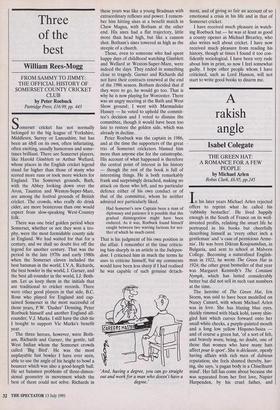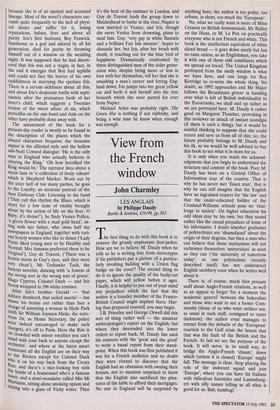A rakish angle
Isabel Colegate
THE GREEN HAT: A ROMANCE FOR A FEW PEOPLE by Michael Arlen Robin Clark, £6.95, pp.245 In his later years Michael Arlen rejected offers to reprint what he called his `rubbishy bestseller'. He lived happily enough in the South of France on its well- invested profits, relishing the smart life he portrayed in his books but cheerfully describing himself as 'every other inch a gentleman' and 'a case of pernicious Arme- nia'. He was born Dikran Koujoumdian, in Bulgaria, and sent to school at Malvern College. Becoming a naturalised English- man in 1922, he wrote The Green Hat in 1924; the other great bestseller of that year was Margaret Kennedy's The Constant Nymph, which has lasted considerably better but did not sell in such vast numbers at the time.
The heroine of The Green Hat, Iris Storm, was said to have been modelled on Nancy Cunard, with whom Michael Arlen was in love. She has blazing blue eyes, thickly rimmed with black kohl, tawny shin- gled hair which curves forward onto her small white cheeks, a purple-painted mouth and a long low yellow Hispano-Suiza and of course a green hat, 'of a sort of felt, and bravely worn; being, no doubt, one of those that women who have many hats affect pour le sport'. She is declassee, openly having affairs with rich men of dubious reputation; she feels shamed thereby, hav- ing, she says, 'a pagan body in a Chiselhurst mind'. Her fall has come about because she was separated from her first love, Napier Harpenden, by his cruel father, and because she is of an ancient and accursed lineage. Most of the novel's characters suc- cumb quite frequently to the hell of physi- cal desire and suffer for it, losing reputations, babies, lives and above all purity. Iris's first husband, Boy Fenwick, handsome as a god and adored by all his generation, died for purity by throwing himself out of a window on the wedding night. It was supposed that he had discov- ered that Iris was not a virgin; in fact, in the end it emerges that Boy had syphilis and could not face the horror of his own caddishness in marrying the spotless Iris. There is a certain sickliness about all this, and about Iris's desperate battle with septi- caemia after the premature birth of her lover's child, which suggests a Twenties notion of the sweet allure of sin, which penicillin on the one hand and Aids on the other have probably done away with.
The amusement of the book for a present-day reader is mostly to be found in the description of the places which the absurd characters frequent; the tiresome aspect is the affected style and the hollow sub-Noel Coward dialogue: 'He is the only man in England who actually believes in obeying the King.' Oh how horrified the King would be.' The narrator lives above a mean lane in 'a collection of lively odours' which is Shepherd Market. Worn out by the utter hell of too many parties, he goes to the Loyalty, an accurate portrait of the then Embassy Club. Listening to the band (`They call this rhythm the Blues, which is short for a low state of vitality brought about by the action of life on the liver. 0 Baby, it's divine!'), he finds Venice Pollen, a green flower with a mad gold head', sit- ting with her father, who owns half the newspapers in England, together with vari- ous hearty women who like to dance (lady PYnte liked young men to be Healthy and Normal; Mrs Ammon preferred them to be Original'), Guy de Travest, (`There was a frozen storm in Guy's eyes, and they were very clean'), Mr Trehawke Tush, the famous novelist, dancing with 'a Jewess of the wrong sort in the wrong sort of green', Hugo Cypress, Colonel Duck — and Iris Storm wrapped in 396 white ermines. After Iris's brother Gerald — 'that solitary drunkard, that soiled ascetic'— has blown his brains out rather than face a charge of annoying a woman in Hyde Park (with Sir William Joynson Hicks, the noto- rious Jix, as Home Secretary, the police were indeed encouraged to make such charges), it's off to Paris. Here the Ritz is so crowded with minor royalties you can't stand with your back to anyone except the orchestra', and where at the latest smart restaurant all the English are on their way to the Riviera except for Colonel Duck who Is on his way back from the Cresta Run, Ito, and there's a nice-looking boy with the hands of a housemaid who's a famous boxer, and a demi-mondaine called Mio Mi Marianne, sitting alone smoking opium and staring into a glass of Vichy water. Then it's the heat of the summer in London, and Guy de Travest leads the group down to Maidenhead to bathe in the river. Napier is now married to Venice, and Iris, though she saves Venice from drowning, plans to steal him. Guy, 'very gay in white flannels and a brilliant Fair Isle sweater', hopes to dissuade her, but Iris, after her brush with death, is reaching out for the blue bird of happiness. Dramatically confronted by three distinguished men of the older gener- ation who, despite being more or less in love with her themselves, tell her that she is smashing a man's career and letting Eng- land down, Iris jumps into her great yellow car and hurls it and herself into the tree beneath which she once parted for ever from Napier.
Michael Arlen was probably right. The Green Hat is nothing if not rubbishy, and being a wise man he knew when enough was enough.



















































 Previous page
Previous page